Real Estate Basics

RENTAL
PROPERTY
BENEFITS
Create cash flow and appreciation
Receive an extra pay check
Own a scarce and physical asset
Make inflation your friend
Reduce your tax bill
It’s been said that real estate has created more wealth for more individuals than any other industry. And you don’t need a college degree or invent the next new app. Yet it’s also been said, and proven, that real estate has created more problems for more individuals than any other industry. Okay, that might be a stretch but all you need to do to verify both of those statements is to take a quick look, if you dare, at the events of the last decade. You know, from around 2001 to 2009 people made money and lost it as a housing bubble was created and subsequently burst. Yet that period is probably the worst series of events to explain real estate investing. In fact, it wasn’t investing at all but speculation. Gambling as it were. But those of us who have invested in real estate and are still active in the market didn’t participate in the housing free-for-all. We simply followed a proven method and repeated it over and over again. There really is little risk in real estate if you know what you’re doing. Real estate investing for beginners can create significant cash flow. You can invest in real estate in many ways like a rental property through an IRA or wholesaling as a beginner. Let’s first examine the benefits:
Create Regular Cash Flow
Generate your extra paycheck with property appreciation as your upside. What that means is someone else is paying off your mortgage and associated expenses for you. Well, not directly of course but the rent you receive each month should be more than enough to cover the mortgage, insurance, property taxes and maintenance costs. Plus you pocket the rest. That’s what is meant by cash flow. All the while your property over time increases in value. You’re creating wealth and getting paid to do it. That’s real estate investing for beginners and what it is really all about.

Comparing Stocks and Bonds to Real Estate
Why invest in real estate compared to other options? You may consider investing in stocks or bonds or a mutual fund with a diversified collection of publicly traded companies but your value is based upon the profitability and performance of the company controlled by a board of directors you’ll never meet. Companies can go bankrupt. Real estate will never reach zero. It does make sense to have a mix, but I can share that I’ve achieved double-digit cash flow returns on my 50 doors and that does not include their appreciating in value or other benefits from ownership like depreciation etc.
Own a Scarce Physical Asset
The amount of land we have is fixed and finite. Real estate is considered a real asset such as gold or silver. It’s an investment that you can touch and feel. Yet unlike gold or silver or any other similar commodity for that matter, real estate provides a monthly cash flow.
Make Inflation Your Friend
Rent always increases over time. Your cash flow and operating profit should rise as rents increase faster than your property expenses, especially if you take out a 30-year mortgage where your largest expense is fixed. Owning a rental portfolio is unique compared to other investments that don’t provide any protection to inflation.
Reduce Your Tax Bill
There are many tax benefits to owning real estate. For example, when it comes time to pay your tax bill you can claim an expense item known as depreciation that isn’t an actual out of pocket expense. Depreciation is an expense that allows for the value of the building (your total house value minus the calculated land value) to be expensed over a set period of time. You can take a percentage of the value of what you paid for your rental property and treat is as an expense each month and reduce you income tax bill and hence increase your cash flow.
REAL ESTATE INVESTMENT STRATEGIES
A real estate investor has a blank canvas with a palette full of colors. Perhaps like an artist who stares at a canvas and wants to paint but what, oh what to paint? Like the artist, real estate investors soon find there are more choices than originally imagined. Here are some of the many strategies available to you and that you’ll hear investors discuss. Oh and don’t worry if you don’t understand them now as we’ll cover them in more detail in the Education Center:
Cruise with Condos! They have low maintenance, no roof to fix or lawns to mow
Sweet Single Family Homes! They have a huge resale audience and appreciation potential
Move with the Multi Family! Love the economies of scale and the higher returns
Shop for Short Sales! You get great deals and big returns
Fabulous Flipping! Go get quick and meaningful returns
Wholesaling is the bomb! You resell without fixing or renting
Gloat when you own the Note! Why have tenants and repair bills when you can be the bank
Never be Cold when you Buy and Hold! Long-term growth and constant cash flow never fails and your tenants pay for it all
Okay, enough of investment strategies and benefits, lets take a look at my first rental property.
THE REAL
WORLD
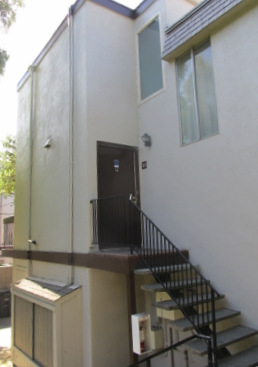
My First Property
The 70's Condo
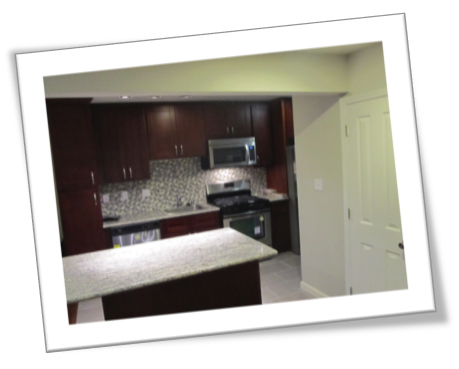
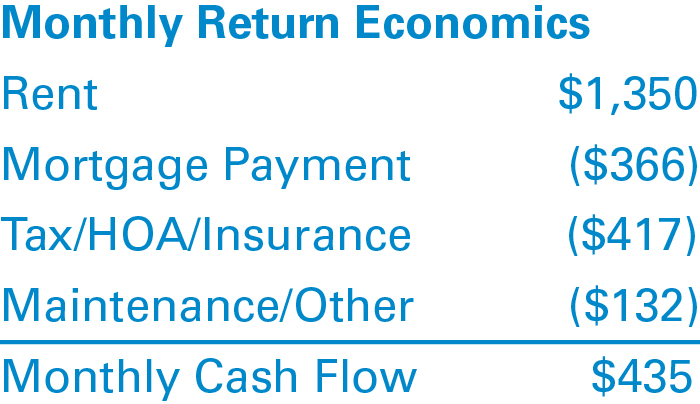
The 70's Condo
I purchased a two-bedroom condo as my first investment property in 2012 for $90,000 in California. My kids thought it was great as they helped me demo the kitchen. It was outdated with a dark tired kitchen and living room with wood panels and mirrors on walls – I know you can imagine exactly how it looked. It hadn’t been updated since Hotel California by the Eagles was first released in the 70’s, but it was a rental and it was in a great location. The location met my market selection criteria and the return penciled out. I put 20% down and took out a 30-year fixed mortgage and invested $6,000 in a new kitchen, removing the wood panels and some fresh paint. It was a small kitchen so I was able to install new cabinets, tile the floor and add some granite and ceiling cans. Lets consider the simplest but actual return economics.
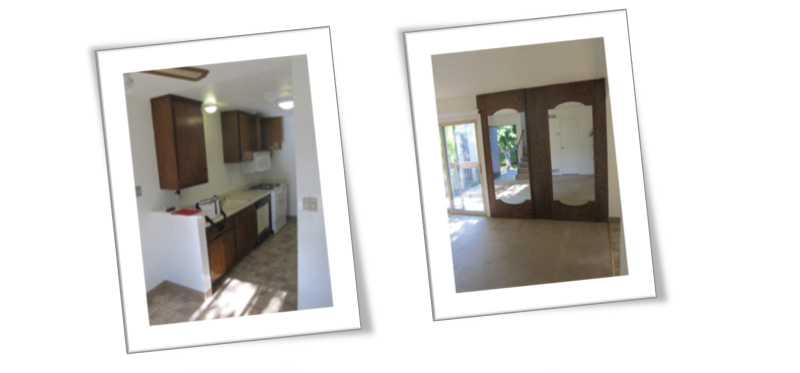
Getting a Return in the 21st Century
The old 70’s look had vanished, and I rented the apartment in about 2 weeks thru craigslist for $1,350 per month. I had expenses to cover of a mortgage payment, property tax, insurance and HOA fees. I also allocated a small amount for a vacancy and repair budget. After which the condo started creating around $435 per month, which was $5,220 annually.
Lets look at the return on investment based upon my initial cash invested. I had invested:
Down payment: $14,400
Closing costs: $2,700
Renovation: $6,000
Total $23,100
Based on the first year cash flow of $435 per month I made $5,220 ($435 x 12) and as a percentage return on my cash investment of $23,100 I made 22% before depreciation and taxes. I’d got my first investment property and was hooked, but what would this investment look like in the long-term.
Looking to the future
I like to be conservative in my assumptions and will set the following expectations going forward; rent increases at 5% (Bay Area specific), expenses increase at 3% and the property appreciates 3% annually. Below you can see the predicted cash flow and equity over time as rent increase and my tenants pay off the mortgage. The analysis that follows suggests that after 10 years I should start to see $1,000 per month cash flow and eventually reach $3,500 in 30 years whereby the mortgage is paid off and I will have created over $200,000 in equity.
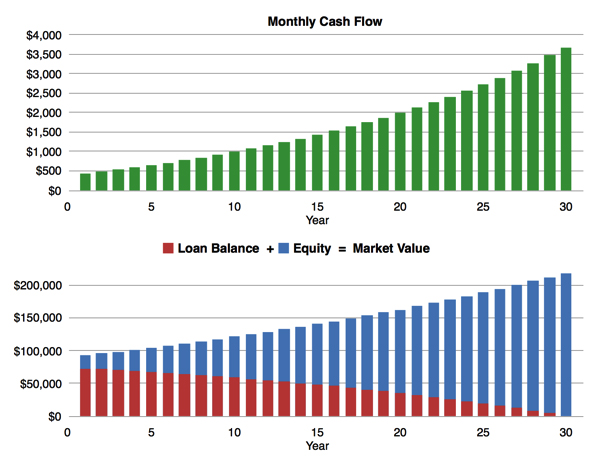
Timing and Being Lucky
For those of you familiar with the California real estate market, you will know that the peaks and troughs in appreciation and rental fees can be unusually large. I wish to convey that sound research and prudence is the right way to approach real estate and so have not adjusted the above returns for how the local market has evolved. I’m now leasing the 70’s condo for $1,600 per month and could easily sell for over $150,000. Timing is an important factor in real estate and please don’t feel like you missed the boat, I see cash on cash returns of over 20% in many states across the USA right now, just not in California.
There are many metrics and evaluation techniques in real estate and I’ve touched on the bare minimum to showcase the benefits here. I give a detailed breakdown of this property and others later including key performance metrics, pictures, inspection summary, lease terms, tenant interview and lessons learned in attempt to share as much real world education as possible. But for now lets summarize the benefits and think about your next steps.
SUMMARY
So here is why real estate is a great investment opportunity
1. It provides regular monthly cash flow, that magical extra pay check
2. Provides long term appreciation opportunity
3. Protects you against inflation
4. Has significant tax benefits
8 Responses to “Real Estate Basics”
Leave a Reply


This section is easy to understand.
Hey thanks Lisa. It’s our goal to make this easy to understand and provide some practical advice and tips..Appreciate all the feedback!
Easy to undrerstand and full of informative knowledge.
Hey thanks Luther. It’s our goal to make this easy to understand yet packed full of advice! Appreciate all the comments and feedback!
Clear info, nicely presented; easy to absorb. Well done!
Hey thanks!. It’s not easy taking complex and sometimes dry boring concepts and making them easy to absorb. We love building wealth and cashflow from real estate! Passive income is the best. We are very passionate about sharing and educating…keep your comments flowing we like them all!
I love how simply this is all explained! Duncan, thank you so much for directing me to this page – I will definitely share it with clients and friends alike
Kristina thanks for the great feedback. We’re trying to help make a difference for new investors so please share with your friends…best